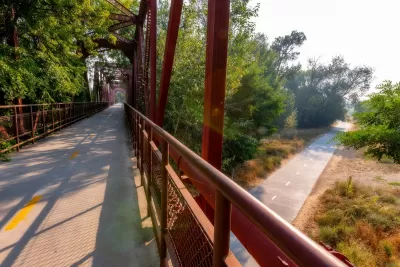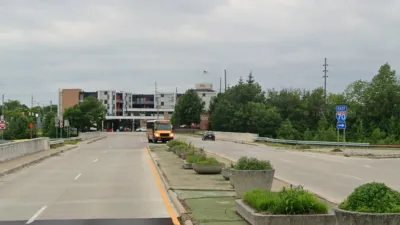Sensors on specially equipped bikes can collect information on trail accessibility and pavement conditions to prioritize maintenance projects.

Bicycles equipped with data collection devices are helping communities understand the conditions of their bike lanes and paths, reports Daniel C. Vock for Route Fifty.
“Local planning organizations have deployed them in Idaho, Iowa, Massachusetts and Minnesota,” Vock adds. “The Des Moines area agency produces heat maps of where distressed pavement is located, which helps local governments identify the problem areas quickly.” In Des Moines, the city wants to map out all of the region’s pathways in two years.
Local governments can use this data to build more resilient trails and understand problem areas. Planners can use the information to prioritize areas for improvement when applying for grants and developing maintenance plans.
The technology isn’t without its challenges: “The devices on board also don’t record debris or the slope of the paths, which would also be helpful for devising maintenance plans. And they don’t capture branches growing over the path or other obstacles that could prevent cyclists from using the trail.”
FULL STORY: Rough ride? Data bikes chart the condition of bike paths in more cities

Planetizen Federal Action Tracker
A weekly monitor of how Trump’s orders and actions are impacting planners and planning in America.

Congressman Proposes Bill to Rename DC Metro “Trump Train”
The Make Autorail Great Again Act would withhold federal funding to the system until the Washington Metropolitan Area Transit Authority (WMATA), rebrands as the Washington Metropolitan Authority for Greater Access (WMAGA).

The Simple Legislative Tool Transforming Vacant Downtowns
In California, Michigan and Georgia, an easy win is bringing dollars — and delight — back to city centers.

The States Losing Rural Delivery Rooms at an Alarming Pace
In some states, as few as 9% of rural hospitals still deliver babies. As a result, rising pre-term births, no adequate pre-term care and harrowing close calls are a growing reality.

The Small South Asian Republic Going all in on EVs
Thanks to one simple policy change less than five years ago, 65% of new cars in this Himalayan country are now electric.

DC Backpedals on Bike Lane Protection, Swaps Barriers for Paint
Citing aesthetic concerns, the city is removing the concrete barriers and flexposts that once separated Arizona Avenue cyclists from motor vehicles.
Urban Design for Planners 1: Software Tools
This six-course series explores essential urban design concepts using open source software and equips planners with the tools they need to participate fully in the urban design process.
Planning for Universal Design
Learn the tools for implementing Universal Design in planning regulations.
Smith Gee Studio
City of Charlotte
City of Camden Redevelopment Agency
City of Astoria
Transportation Research & Education Center (TREC) at Portland State University
US High Speed Rail Association
City of Camden Redevelopment Agency
Municipality of Princeton (NJ)




























